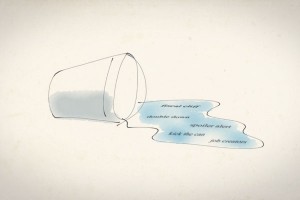 I used to love lists.
I used to love lists.
I was a kid when the first Book of Lists hit the shelves, and full as it was of weird deaths, names for things you didn’t know had names, and other prurient trivia that I would become increasingly interested in as the years passed, I couldn’t get enough of it.
Even then I was suspicious though. I compared it to the more prescriptive, by turns weirder, and less interesting Guinness Book of World Records, and wondered, What makes a list, anyway? Isn’t it just a bunch of related trivia that you put numbers in front of?
Zip forward a few decades and with a few exceptions, I don’t much care for lists. Sure, there are some good ones. The 5 Creepiest Unsolved Crimes at cracked.com had me poring over clues and VHS transfers of documentaries about the Taman Shud case for an entire weekend (though I believe the B.C. feet thing is largely solved at this point). And you can’t argue with David Letterman’s success, though I would argue his Top Ten List hinges on the inherent pointlessness of lists, leading to brilliant segments like my all-time favourite “Top 10 words that almost rhyme with ‘nurse.'”
But for the most part, I hate lists now, particularly in online article format. I blame the fact that I am a writer; I also blame the internet. Because nothing says “click bait” like “7 ways to optimize your SEO.” And click bait is worse than trivia, because it comes from a content farm, and before that from sources that you could very easily track down yourself on the first page of search results for whatever the topic of the article is. It’s too boring and useless to even be called trivia, it’s poorly written and vague, and really is just a mashup of stuff from Wikipedia and other content farms with barely enough editing and rewriting to avoid copyright infringement. There’s no form or depth to click bait. It sucks your soul out through your eyeballs.
Lists are easy to write, which makes them popular with lazy writers. But perhaps the most infuriating thing about them is that they’re popular with lazy readers, too, which means that they actually work, which explains to some degree their popularity in the content farming business. You could research why they work, as there is a metric pantload of articles out there explaining why we like lists so much – many of them in convenient, easy-to-read list format. And of course you can find lists of reasons people don’t.
I felt compelled to write about lists after reading the 38th annual List of Words to be Banished from the Queen’s English for Misuse, Overuse and General Uselessness, published by Lake Superior State University. Aside from the fact that everyone writes lists of the 10 best or 20 worst or 7 most mis-used whatsits of the year as it lumbers to a close, the LoWtbBBtQEfMOaGU is a lighthearted way for a group of academics to express solidarity with people in the general population who care about the proper use of words. People like me. And you, I’m assuming, if you haven’t drifted off by now.
And so I take it in the spirit intended. We can’t really go around banning words. That would be precisely Orwellian. We can’t eliminate the phrase “double down” from the language, because then what would you say if you were providing colour commentary for a competitive blackjack tournament and someone decided to, you know. “Kick the can down the road” isn’t even really that egregious, is it? It was in the news a lot because some tool said it last year, and when we stop talking about that guy (we’re pretty much done now, aren’t we?) then it will go back to relatively infrequent use. And you only really hear “YOLO” ad infinitum if you’re regularly exposed to teenagers, or Drake. And if either of those conditions applies to you, you have my sympathy.
As for “fiscal cliff” I do understand the fatigue, in spite of not being American, but like “double down” it retains a certain utility, in this example allowing Chris Hedges to debunk it roundly. Likewise if we didn’t have a phrase like “job creators” then we couldn’t appreciate fully Noam Chomsky reminding us that “jobs” is a euphemism for the unpronounceable word “profits.”
There is one phrase on that list, however, that I’m all for banishing, in all seriousness: bucket list. I have a hard time imagining a more offensively patronizing thing to say to a reader than “your life will remain unfulfilled until you have completed the items on this list which I have compiled for you.” What makes a writer think it’s appropriate to attempt to give weight to his travel article by throwing my mortality on top of it? And yet margins and footers of thousands of websites are littered with headlines telling me about the hundred and eleven things I have to try, places I have to visit, knucklehead stunts I have to attempt, before I can claim to have lived at all. And you’re going to name your list after some lukewarm has-been star vehicle with a 42 metascore that I can only see myself watching if were immobilized by injury or illness and unable to reach the remote? You obviously have the taste and enlightenment I look for in a life coach. Sign me up.

